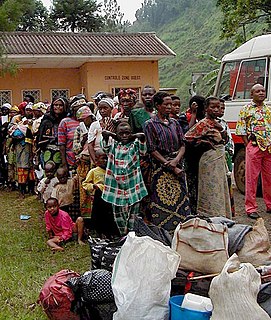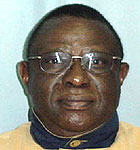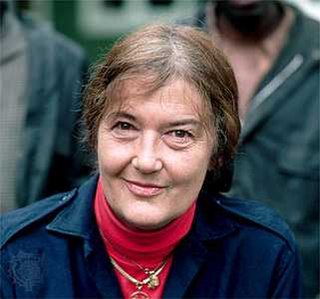![United Nations Assistance Mission for Rwanda Failed UN Mission to mediate peace in Rwanda leading up to the [[Rwandan genocide]]](https://upload.wikimedia.org/wikipedia/commons/thumb/5/52/Emblem_of_the_United_Nations.svg/320px-Emblem_of_the_United_Nations.svg.png)
The United Nations Assistance Mission for Rwanda (UNAMIR) was established by United Nations Security Council Resolution 872 on 5 October 1993. It was intended to assist in the implementation of the Arusha Accords, signed on 4 August 1993, which was meant to end the Rwandan Civil War. The mission lasted from October 1993 to March 1996. Its activities were meant to aid the peace process between the Hutu-dominated Rwandese government and the Tutsi-dominated rebel Rwandan Patriotic Front (RPF). The UNAMIR has received much attention for its role in failing, due to the limitations of its rules of engagement, to prevent the Rwandan genocide and outbreak of fighting. Its mandate extended past the RPF overthrow of the government and into the Great Lakes refugee crisis. The mission is thus regarded as a major failure.

The Rwandan genocide, also known as the genocide against the Tutsi, was a mass slaughter of Tutsi in Rwanda during the Rwandan Civil War, which had started in 1990. It was directed by members of the Hutu majority government during the 100-day period from 7 April to mid-July 1994. An estimated 500,000 to 1,000,000 Rwandans were killed, constituting an estimated 70% of the Tutsi population. Additionally, 30% of the Pygmy Batwa were killed. The genocide and widespread slaughter of Rwandans ended after the Tutsi-backed and heavily armed Rwandan Patriotic Front (RPF), led by Paul Kagame, took control of the capital and the country. An estimated 2,000,000 Rwandans, mostly Hutu, were displaced and became refugees.

Agathe Uwilingiyimana, sometimes known as Madame Agathe, was a Rwandan political figure. She served as Prime Minister of Rwanda from 18 July 1993 until her assassination on 7 April 1994, during the opening stages of the Rwandan genocide. She was Rwanda's first and so far only female prime minister.

The Second Congo War began in the Democratic Republic of the Congo in August 1998, little more than a year after the First Congo War, and involved some of the same issues. The war officially ended in July 2003, when the Transitional Government of the Democratic Republic of the Congo took power. Although a peace agreement was signed in 2002, violence has continued in many regions of the country, especially in the east. Hostilities have continued since the ongoing Lord's Resistance Army insurgency, and the Kivu and Ituri conflicts.

Colonel Théoneste Bagosora is a former Rwandan military officer. He is chiefly known for his key role in the 1994 Rwandan genocide, for which he has been sentenced to life imprisonment by the International Criminal Tribunal for Rwanda (ICTR). In 2011, the sentence was reduced to 35 years' imprisonment on appeal. He will be imprisoned until age 89.
Queen Dowager Rosalie Gicanda was the wife of Rwandan Mwami Mutara III of Rwanda. After her husband died in mysterious circumstances in 1959, the Rwandan monarchy lasted only two more years, under the leadership of Mwami Kigeli V of Rwanda and then coming to an end in 1961. However, the Queen continued to live in Butare in Butare Province, Rwanda, along with her mother and several ladies-in-waiting.

The Kagera River, also Akagera River, or Alexandra Nile, is an East African river, forming part of the upper headwaters of the Nile and carrying water from its most distant source.
Major Bernard Ntuyahaga is a Rwandan army officer convicted by a Belgian court for the murders of ten United Nations peacekeepers at the start of the Rwandan Genocide.
Nyamasheke is a district (akarere) in Western Province, Rwanda. Its capital is Nyamasheke town (Kagano).

Génocidaires are those guilty of the mass killings of the 1994 Rwandan Genocide, in which close to a million Rwandans, primarily Tutsis, were murdered by their Hutu neighbors. In the aftermath of the genocide, those guilty of organizing and leading the genocide were put on trial at the International Criminal Tribunal for Rwanda. Those guilty of lesser crimes—participation, profiting through seizing Tutsi property, etc.—were put on trial in gacaca courts.

Human rights in Rwanda have been violated on a grand scale. The greatest violation is the Rwandan genocide of Tutsi in 1994. The post-genocide government is also responsible for grave violations of human rights.

The Gikondo massacre was the mass murder of about 110 people of Tutsi identity, including children, who sheltered in a Polish Pallottine mission church in Gikondo, Kigali. The massacre took place on April 9, 1994 and was executed by Interahamwe militia under supervision of the Hutu presidential guard. The massacre was the first absolute proof of a genocide discovered by UNAMIR during the Rwandan Genocide in 1994.
Prostitution in Rwanda is illegal in all aspects. Prostitutes, clients and any involved third parties are criminalised by the Penal Code. However, a draft of a new Penal code that doesn't prohibit prostitution was presented for debate in the Rwandan Parliament in December 2017.

United Nations Security Council resolution 925, adopted unanimously on 8 June 1994, after reaffirming all resolutions on the situation in Rwanda, particularly resolutions 912 (1994) and 918 (1994), and Resolution 868 (1993) on the safety of United Nations peacekeepers, the Council deployed additional battalions and extended the mandate of the United Nations Assistance Mission for Rwanda (UNAMIR) until 9 December 1994.
The Democratic Green Party of Rwanda is a green political party in Rwanda, established in 2009. The party was registered in August 2013, but too late to contest the 2013 parliamentary elections. Its platform emphasizes unity, non-violence, social justice, participatory democracy, and calls for subsidized prices for agricultural produce. It believes that the unalienable rights of the people include "the right to life, liberty, peaceful assembly, expression, worship and the pursuit of happiness", and that these rights are granted by God.
André Kagwa Rwisereka was vice-chairman of the Democratic Green Party of Rwanda, a political party founded in August 2009 in Rwanda. He was found murdered and partially beheaded near a wetland in Butare on 14 July 2010. The party chairman Frank Habineza was among opposition leaders who called for an independent international investigation into the murder, which may have had a political motivation.
The following lists events that happened during 1994 in the Republic of Rwanda.
The following lists events that happened during 2015 in Rwanda.



![United Nations Assistance Mission for Rwanda Failed UN Mission to mediate peace in Rwanda leading up to the [[Rwandan genocide]]](https://upload.wikimedia.org/wikipedia/commons/thumb/5/52/Emblem_of_the_United_Nations.svg/320px-Emblem_of_the_United_Nations.svg.png)






